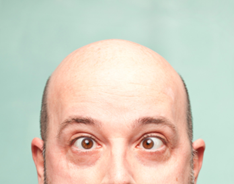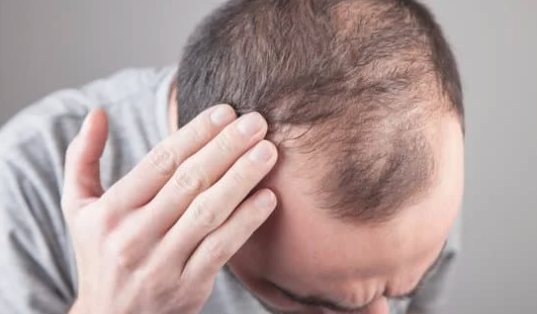Hair Loss Treatment at Home for Men
Hair Loss Treatment at Home for Men :
Male AndroGenetic Alopecia
Male Pattern hair loss is a common condition that affects many men at some point in their lives. It can be caused by a variety of factors, including genetics, age, and hormonal changes. Male pattern baldness, also known as androgenetic alopecia, is the most common cause of hair loss in men. Today – at last – there is more than one available Hair Loss Treatment at home for Men.
If you are experiencing hair loss, it is important to understand the underlying causes and available treatment options. While some men choose to embrace their baldness, others may feel self-conscious or embarrassed by their hair loss. There are a variety of treatments available, including medications, hair transplant surgery, and lifestyle changes, that can help slow or even reverse hair loss.
In this article, we will explore receding hairline symptoms and the many causes of male hair loss, as well as the different types of hair loss, and the available treatment options. We will also discuss ways to prevent hair loss and promote healthy hair growth. Whether you are just starting to notice thinning hair or have been dealing with hair loss for years, I believe that this article will provide you with the information you need to make informed decisions about Hair Loss Treatment for Men at Home and whether it is right for you.
What Causes Male Hair Loss?
Hair-Fall Reasons in Males
Male hair loss or receding hairline symptoms can be caused by various factors, including genetics, hormones, and medical conditions. Here are some of the most common causes of most male’s receding hairline:
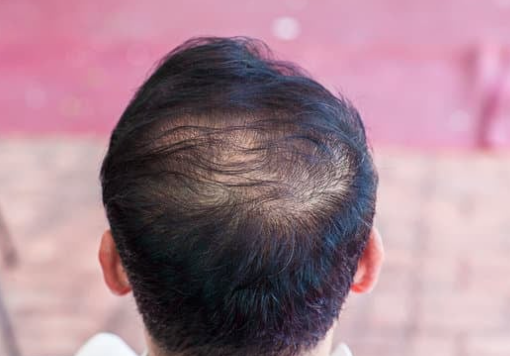
Genetics
Genetics plays a significant role in male hair loss. Male pattern baldness, also known as androgenetic alopecia, is the most common type of hair loss among men. This condition is inherited from either the mother’s or father’s side of the family. Male pattern baldness typically starts with a receding hairline and thinning of the hair on the crown of the head. Over time, the hair loss may progress to complete baldness.
Hormones
Hormones also play a crucial role in male hair loss. The male hormone testosterone is converted into dihydrotestosterone (DHT) by an enzyme called 5-alpha-reductase. DHT shrinks hair follicles, which can lead to hair loss. This is why male hair loss is often associated with an increase in DHT levels.
Medical Conditions
Certain medical conditions can also lead to male hair loss. These include:
- Alopecia areata: a condition in which the immune system attacks hair follicles, causing hair loss in patches.
- Scalp infections: fungal infections of the scalp can cause hair loss.
- Thyroid disorders: an overactive or underactive thyroid gland can cause hair loss.
- Nutritional deficiencies: a lack of certain nutrients, such as iron and vitamin D, can lead to hair loss.
- Medications: certain medications, such as chemotherapy drugs, can cause hair loss.
Male pattern baldness can therefore be caused by genetics, hormones, and medical conditions. If you are experiencing hair loss, it is wise to speak to a healthcare provider to determine the underlying cause and explore treatment options.
How to deal with Balding –
Hair Loss Treatment at Home for Men
If you’re experiencing male hair loss, there are several treatment options available to you. In this section, we’ll explore three main categories of treatment: prescription medications, topical treatments, and hair transplantation.
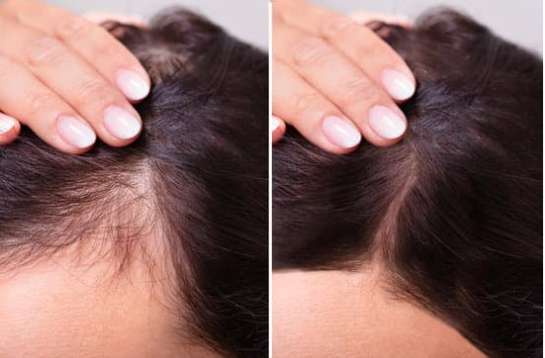 Prescription Medications
Prescription Medications
Prescription medications are a common treatment for male hair loss. One popular drug is Propecia, which contains the active ingredient finasteride. Finasteride works by blocking the conversion of testosterone to dihydrotestosterone (DHT), which is a hormone that contributes to hair loss.
Propecia has been shown to be effective in clinical trials, with up to 90% of men experiencing either hair regrowth or no further hair loss. However, it’s important to note that Propecia is not suitable for everyone and can have side effects, including decreased libido and erectile dysfunction (ED).
Other prescription medications that may be used to treat male hair loss include dutasteride and minoxidil.
Hair Loss Treatment at Home for Men: Topical Treatments
Topical treatments are another option for treating male hair loss. Minoxidil is a popular topical treatment that is available over-the-counter. It works by widening blood vessels in the scalp, which can increase blood flow and stimulate hair growth.
Other topical treatments that may be used to treat male hair loss include ketoconazole shampoo and corticosteroid injections.
Hair Transplantation
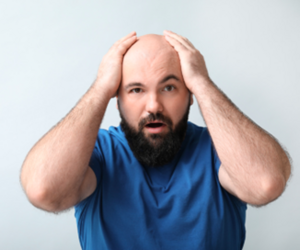 Hair transplantation is a surgical procedure that involves moving hair follicles from one part of the scalp to another. This can be an effective treatment for male hair loss, particularly for those with advanced hair loss.
Hair transplantation is a surgical procedure that involves moving hair follicles from one part of the scalp to another. This can be an effective treatment for male hair loss, particularly for those with advanced hair loss.
There are two main types of hair transplantation: follicular unit transplantation (FUT) and follicular unit extraction (FUE). FUT involves removing a strip of skin from the scalp and then dissecting it into individual hair follicles, which are then transplanted into the balding area. FUE involves removing individual hair follicles from the scalp and then transplanting them into the balding area.
Hair transplantation can be expensive and may require multiple sessions to achieve the desired results. However, it can be a long-lasting solution for male hair loss.
In conclusion, if you’re experiencing male hair loss, there are several treatment options available to you. Prescription medications, topical treatments, and hair transplantation are all viable options, depending on your individual needs and preferences. Be sure to consult with a healthcare professional to determine the best course of treatment for you.
Natural Home Remedies for Male Hair Loss –
including Men’s Hair Loss Supplements
If you’re looking for natural remedies for male hair loss, there are several options that you can try. These remedies include dietary changes, lifestyle changes, and supplements.
Dietary Changes
Your diet can have a significant impact on the health of your hair. To promote hair growth and prevent hair loss, you should consume foods that are rich in vitamins and minerals. Some of the best foods for hair health include:
- Leafy greens like spinach and kale
- Nuts and seeds like almonds and sunflower seeds
- Fruits like berries and citrus fruits
- Whole grains like brown rice and quinoa
- Lean proteins like chicken and fish
In addition to these foods, you may also want to consider taking a vitamin E supplement. Vitamin E is an antioxidant that can help to improve blood circulation and promote hair growth.
Lifestyle Changes
In addition to making dietary changes, you may also need to make lifestyle changes to prevent hair loss. Some of the lifestyle changes that can help to promote hair growth include:
- Managing stress through techniques like meditation and yoga
- Getting regular exercise to improve blood circulation
- Avoiding harsh hair treatments like coloring and perming
- Using a gentle shampoo and conditioner to avoid damaging your hair
Hair Loss Treatment for Men at Home: Supplements
Supplements can also be an effective way to promote hair growth and prevent hair loss. Some of the best supplements for hair health include:
- Biotin: This B vitamin can help to strengthen hair and prevent breakage.
- Iron: Iron deficiency can lead to hair loss, so taking an iron supplement can be beneficial.
- Vitamin D: This vitamin is essential for hair growth and can be obtained through sun exposure or supplements.
- Zinc: Zinc helps to regulate the production of oil in the scalp, which can improve hair health.
It’s important to note that while natural remedies can be effective, they may not work for everyone. If you’re experiencing significant hair loss, it’s important to talk to your doctor to determine the underlying cause and develop an appropriate treatment plan.
How to Prevent Male Hair Loss:
Hair Loss Treatments at Home for Men
Male hair loss is a common condition that can be caused by a variety of factors, including genetics, age, and lifestyle choices. While some hair loss is inevitable, there are steps you can take to slow down the process and help prevent further hair loss. Here are some tips to help you prevent male hair loss:
Best Home Hair Loss Treatment for Men
Maintaining healthy hair habits can go a long way in preventing hair loss. Here are some things you can do:
- Eat a balanced diet: A diet rich in vitamins and minerals can help promote healthy hair growth. Make sure to include plenty of protein, iron, and vitamins A, C, and E in your diet.
- Avoid harsh styling products: Some hair styling products, such as gels and sprays, can damage your hair and cause it to break. Try to limit your use of these products or opt for gentler alternatives.
- Shampoo Hair Loss in Men: Beware, washing your hair too often can strip it of its natural oils, which can lead to dryness and breakage. Try to limit your hair washing to every other day or every few days.
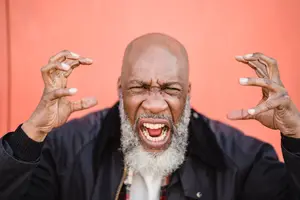 Stress Management
Stress Management
Stress can contribute to hair loss, so finding ways to manage your stress levels can help prevent hair loss. Here are some things you can do:
- Exercise regularly: Exercise is a great way to reduce stress and promote overall health. Try to get at least 30 minutes of exercise per day.
- Practice relaxation techniques: Techniques such as deep breathing, meditation, and yoga can help reduce stress and promote relaxation.
- Get enough sleep: Lack of sleep can contribute to stress and other health problems. Try to get at least 7-8 hours of sleep per night.
Scalp Care
Taking care of your scalp can also help prevent hair loss. Here are some things you can do:
- Keep your scalp clean: A clean scalp is essential for healthy hair growth. Make sure to wash your hair regularly with a gentle shampoo.
- Massage your scalp: Massaging your scalp can help improve blood flow to the hair follicles, which can promote healthy hair growth.
- Avoid tight hairstyles: Tight hairstyles, such as braids and ponytails, can pull on your hair and cause it to break. Try to avoid these styles or wear them less frequently.
By incorporating these healthy habits into your daily routine, you can help slow down hair loss and promote healthy hair growth. Remember, prevention is key, so start taking care of your hair and scalp today.
How to Promote Hair Growth After Hair Loss
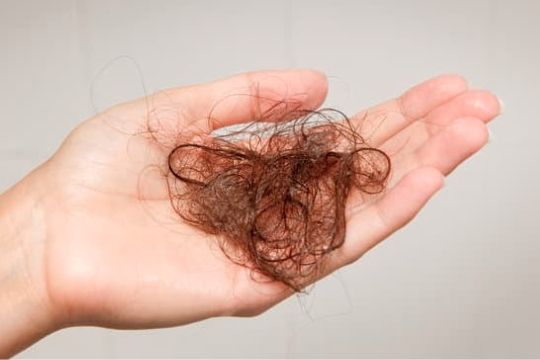
Losing hair can be a frustrating experience, but there are ways to promote hair growth after hair loss. Here are a few methods for how to deal with balding that you can try:
Dietary Changes
Your diet plays a significant role in promoting hair growth. Eating a balanced diet that includes protein, vitamins, and minerals can help your hair grow thicker and stronger. Some of the nutrients that can promote hair growth include:
- Protein: Your hair is made of protein, so it’s essential to include enough protein in your diet. Good sources of protein include meat, fish, eggs, and legumes.
- Iron: Iron deficiency can lead to hair loss. Good sources of iron include red meat, poultry, fish, and leafy green vegetables.
- Biotin: Biotin is a B vitamin that is essential for hair growth. Good sources of biotin include eggs, nuts, and whole grains.
- Vitamin D: Vitamin D is important for hair growth, and many people don’t get enough of it. You can get vitamin D from sunlight, fatty fish, and fortified foods.
Scalp Massage
Scalp massage can help promote hair growth by increasing blood flow to the hair follicles. You can use your fingers or a scalp massager to gently massage your scalp for a few minutes each day. You can also use essential oils like rosemary, lavender, or peppermint to stimulate hair growth.
Hair Growth Products – The Best Home-Treatment to Grow Hair…
There are several hair growth products available that can help promote hair growth after hair loss. Minoxidil is an over-the-counter medication that is applied to the scalp to promote hair growth. Finasteride is a prescription medication that can also help promote hair growth. Other hair growth products include:
- Hair growth shampoos: These shampoos contain ingredients like biotin, caffeine, and ketoconazole that can help promote hair growth.
- Hair growth supplements: These supplements contain vitamins, minerals, and herbs that can help promote hair growth.
Remember that promoting hair growth after hair loss takes time, and results may vary. It’s essential to be patient and consistent with your hair growth regimen. If you’re concerned about hair loss, it’s always a good idea to talk to a healthcare professional.
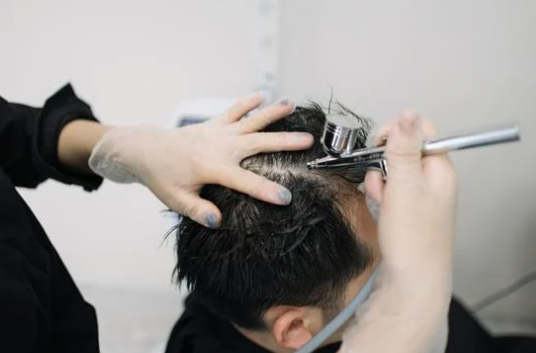
Factors That Contribute to Hair Loss
Male hair loss can be a distressing experience that affects your confidence and self-esteem. While hair loss can be a natural part of aging, there are several factors that can contribute to hair loss. Understanding these factors can help you take proactive steps to prevent or slow down hair loss.
Weight Loss
Losing weight can be a great achievement for your health, but it can also lead to hair loss. Rapid weight loss can cause your body to go into shock, which can lead to hair loss. This is because your body is diverting its energy towards essential functions, such as your heart and brain, and away from non-essential functions like hair growth. If you are losing weight, make sure you are doing it in a healthy and gradual way to minimize the risk of hair loss.
Stress
Stress is a common cause of hair loss. When you are stressed, your body produces more cortisol, which can disrupt your hair growth cycle and lead to hair loss. Stress can also cause you to pull or twist your hair, which can damage your hair follicles and lead to hair loss. If you are experiencing stress, try to find ways to manage it, such as through exercise, meditation, or therapy.
Environmental Factors
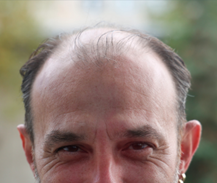 Environmental factors can also contribute to hair loss. Exposure to pollutants, chemicals, and UV rays can damage your hair and lead to hair loss. Wearing hats and using hair products with SPF can help protect your hair from UV damage. Additionally, using a shower filter can help remove harmful chemicals from your water and protect your hair.
Environmental factors can also contribute to hair loss. Exposure to pollutants, chemicals, and UV rays can damage your hair and lead to hair loss. Wearing hats and using hair products with SPF can help protect your hair from UV damage. Additionally, using a shower filter can help remove harmful chemicals from your water and protect your hair.
Which vitamin deficiencies cause hair loss? Deficiencies in certain nutrients, such as iron and vitamin D, can also contribute to hair loss. If you are experiencing hair loss, it may be worth checking with your doctor to see if you have any nutrient deficiencies that need to be addressed.
Male pattern hair loss, also known as androgenetic alopecia, is a hereditary condition that can also contribute to hair loss. This condition is caused by a combination of genetic and hormonal factors and can lead to hair loss in a specific pattern, such as a receding hairline or bald spot on the crown of the head. If you are experiencing male pattern hair loss, there are several treatments available, including medication and hair transplant surgery.
Overall, there are several factors that can contribute to hair loss in men. By understanding these factors, you can take proactive steps to prevent or slow down hair loss and maintain healthy hair.
Frequently Asked Questions:
Home Hair Loss Treatments for Men
What are the most common causes of hair loss in men?
Hair loss in men can be caused by a variety of factors, including genetics, age, hormonal changes, medical conditions, and certain medications. Male pattern baldness, also known as androgenetic alopecia, is the most common cause of hair loss in men, accounting for over 95% of cases.
What are the best hair loss treatments for men?
There are several hair loss treatments available for men, including medications, hair transplant surgery, and low-level laser therapy. Minoxidil and finasteride are two FDA-approved medications that have been shown to be effective in treating male pattern baldness. Hair transplant surgery involves taking hair follicles from a donor area and transplanting them to the balding area. Low-level laser therapy is a non-invasive treatment that uses light energy to stimulate hair growth.
Is male pattern baldness hereditary?
Yes, male pattern baldness is hereditary. It is caused by a combination of genetic and hormonal factors, and can be passed down from either side of the family. If you have a family history of male pattern baldness, you are more likely to experience hair loss as you age.
What’s the best thing to regrow hair? Are there natural hair loss remedies for men?
 While there is no cure for male pattern baldness, there are some natural remedies that may help slow down hair loss or promote hair growth. These include taking supplements like biotin and saw palmetto, using essential oils like rosemary and peppermint, and massaging the scalp to increase blood flow.
While there is no cure for male pattern baldness, there are some natural remedies that may help slow down hair loss or promote hair growth. These include taking supplements like biotin and saw palmetto, using essential oils like rosemary and peppermint, and massaging the scalp to increase blood flow.
Can You Reverse Thinning Hair? Even stop male pattern baldness?
While hair loss in men cannot be completely reversed, there are treatments available that can slow down the process and promote hair growth. It is important to start treatment as early as possible to maximize results.
What lifestyle changes can men make to prevent hair loss?
Maintaining a healthy lifestyle can help prevent hair loss in men. This includes eating a balanced diet rich in vitamins and minerals, getting regular exercise, managing stress, avoiding smoking and excessive alcohol consumption, and protecting your hair from damage by wearing hats and avoiding harsh styling products.

